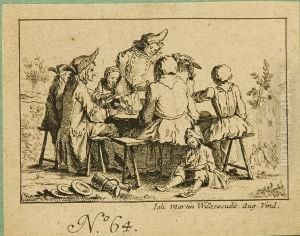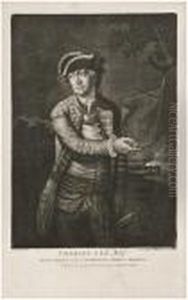Johann Martin Will Paintings
Johann Martin Will was a German engraver and publisher, born in 1727 in the city of Kempten in the Holy Roman Empire. He is known for his works as a copper engraver during the 18th century, a time when printmaking was a vital form of visual communication.
Will began his career as an engraver at a relatively young age, training in the arts of etching and engraving, which were crucial skills for producing illustrations for books, maps, and standalone prints. Throughout his career, he produced a wide array of works, including portraits, landscapes, and political satires. Will's engravings were not limited to artistic expressions but also served educational and commercial purposes.
He moved to Augsburg, which was a significant center for publishing in Germany at the time, and from there his works were distributed to a broader audience across Europe. Will established his name and became part of the thriving artistic community in the city. His work was characterized by its fine detail and clear lines, reflecting the Rococo style that was popular during his lifetime.
Johann Martin Will is also known for his involvement in the production of geographical atlases and maps. His work in cartography was significant, and he contributed to the dissemination of geographical knowledge through his detailed engravings of maps. Will's prints often included elaborate decorative elements, making them both informative and aesthetically pleasing.
Despite his prolific output, Will is not as widely recognized as some of his contemporaries. His work, however, remains an important part of the history of printmaking and provides valuable insights into the cultural and political life of 18th-century Europe.
Johann Martin Will passed away in 1806. Although his name might not be at the forefront of renowned artists from the period, his contributions to the arts of engraving and publishing have ensured that his works are preserved and studied by art historians and collectors to this day.

